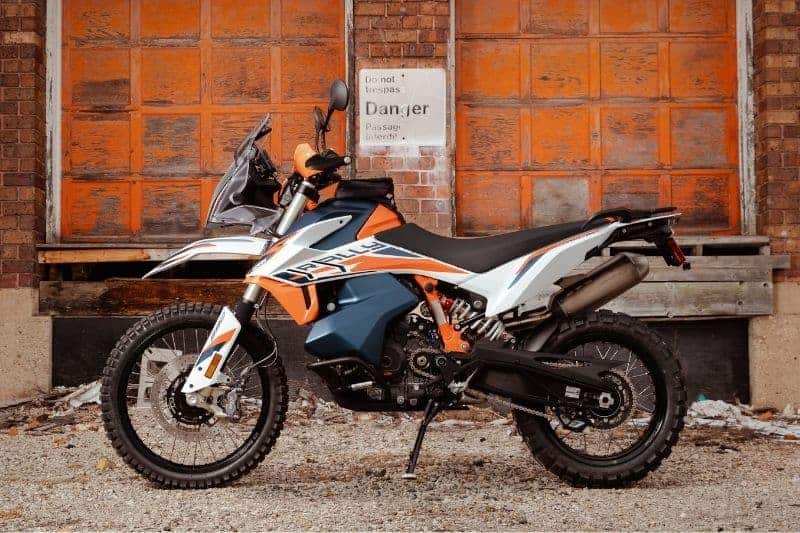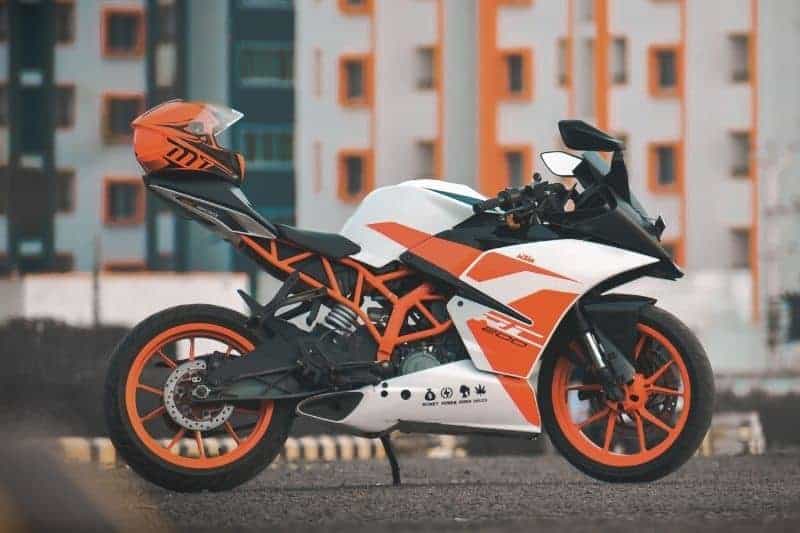Choosing the right kind of motorcycle for you can be a very different task—especially with so many different options on the market.
As it happens, there are also a lot of different options in terms of engine displacement. And if you are here, you are probably interested in finding out more about 150cc and 200cc motorcycles.
What are the things to keep in mind before purchasing a motorcycle? Before making a purchasing decision or any other decision, it is only natural to gather as much information as possible. In this article, you will find an in-depth look at both 150cc and 200cc motorcycles.
Table of Contents
By the end of the article, you will have a good idea of what these types of motorcycles are capable of and whether or not they are really for you. So let’s take a look.

An overview of 150cc motorcycles
In terms of power and torque, 150cc motorcycles are definitely not one of the best motorcycles. In fact, they are fairly slow. This is why they are not exactly the first pick by most riders.
The smaller engine displacement results in lower top speed and acceleration. This gives 150cc motorcycles a more limited application, but that does not mean they are not fun to ride.
This also means that most 150cc motorcycles are fairly slow and have an average top speed of 55 mph. That being said, normally, 150cc motorcycles can reach between 40 mph to 70 mph. Some of the more powerful and modded 150cc motorcycles can even go as high as 85 mph.
The time it takes most 150cc motorcycles to go from 0 to 60 mph is also not the greatest, usually, ranging from 10 to 17 seconds.
On the other hand, 150cc motorcycles are very light and easy to control. They are definitely not going to give riders a lot of trouble in terms of handling. This makes them a lot of fun riding in the city and backroads. Usually, they are very nimble and quick at the low end but lack power in the mid to high end.
Another advantage of 150cc motorcycles is that they are very lightweight. Normally 150cc motorcycles weigh between 240 and 350 pounds (or about 110 kg to 160 kg).
An overview of 200cc motorcycles
In terms of speed, 200cc motorcycles, due to their larger engine displacement, are normally faster than 150cc motorcycles. As a result, 200cc motorcycles may be a bit more appealing to some people.
The average speed of most 200cc motorcycles is about 60 mph. However, some 200cc motorcycles can comfortably reach speeds of 74 to 87 mph, depending on the type of motorcycle, riding conditions, and mods installed (if any).
Due to their larger engine displacement, 200cc motorcycles can accelerate a little faster, too. And thanks to the smaller engine displacement and the motorcycle’s overall low weight, 200cc motorcycles are normally very nimble, quick, and easy to handle.
Most 200cc motorcycles usually weigh 340 lbs on average (or about 154 kg).

What is the difference between 150cc and 200cc motorcycles?
The difference between 150cc and 200cc motorcycles is in power. Both 150cc motorcycles and 200cc motorcycles are considered more sluggish and fairly slow. However, 200cc motorcycles will generally be faster than most 150cc motorcycles.
Speed
Typically 150cc motorcycles can have between 13hp to 19hp. On the other hand, 200cc motorcycles can have between 18hp and 25hp.
Most 200cc motorcycles are faster than 150cc motorcycles, but not by a huge margin. Both 150cc and 200cc motorcycles will have fairly similar top speeds, with 200cc motorcycles being slightly higher.
Most 150cc motorcycles can reach average speeds between 40 to 70mph, while 200cc motorcycles can go up to 87 mph.
Acceleration-wise on the low end, both 150cc and 200cc motorcycles will do just fine, but in terms of top speed and top-end acceleration, they are a bit lackluster.
Beginner-friendliness
Both 150cc and 200cc motorcycles are good for beginners. Both are not too powerful and are fairly easy to handle and ride, so they are safer than other more powerful motorcycles. However, they should be used on city roads and back roads only.
See article: What CC motorcycle should a beginner get?
Highway commuting
If you are looking for a daily highway commuter, neither 200cc nor 150cc motorcycles will be enough.
The problem is that both 150cc and 200cc motorcycles will not have a lot of passing power when moving at highway speeds, which can put the rider in danger.
Some 200cc and the vast majority of 150cc motorcycles will not be able to keep up with the rest of the highway traffic. On top of that, many 150cc motorcycles may not even be able to reach the minimum highway speeds.
Payload capacity
You may have heard the notion that 10 lbs gain is equal to losing 1 hp. Sometimes people say the rule is 1 hp lost for every 7 lbs gained, but the 1:10 ratio is usually closer to what you will experience with most motorcycles.
In other words, for every 10 lbs the motorcycle has to carry, it loses 1 hp. This rule of thumb is connected to the motorcycle’s power-to-weight ratio, and generally speaking, a lighter motorcycle will always move faster than a similar but heavier motorcycle.
With low displacement engines, the rider’s weight and any additional weight can have a notable impact on the top speed the motorcycle can reach, its acceleration, and handling.
For example, adding an extra 50 pounds to a 150cc motorcycle can sometimes reduce its top speed by 2 to 10 mph. On a 200cc motorcycle, the impact may be slightly less evident, but the rider will be able to feel it, nonetheless. This is why it is recommended for heavier riders or people carrying more stuff around to consider more powerful motorcycles.
Maintenance costs and taxes
Both 150cc and 200cc motorcycles have low maintenance costs. That being said, 200cc motorcycles may have slightly more expensive maintenance costs than 150cc motorcycles.
Typically the main difference in costs will be the insurance costs and road taxes, which will be slightly higher for 200cc motorcycles compared to 150cc motorcycles due to the bigger engine capacity.
Touring
Long-distance commuting can be very difficult and tiring because both 150cc and 200cc motorcycles are not very fast.
Since you will be fairly limited in how fast you can go, long-distance travel is more difficult and time-consuming.
Safety
More powerful motorcycles usually allow the rider not just to slow down but also, if necessary, to speed up in order to avoid a dangerous situation on the road.
With low cc motorcycles, accelerating in a pinch can either be very difficult to do or outright impossible to do, depending on the speed of travel.
With a 200cc motorcycle, the rider has a little more powerful motorcycle at his disposal, which can give them a tad more acceleration if needed but not by a huge margin over a 150cc motorcycle.
Due to the low torque and top speed, both 150cc and 200cc motorcycles may end up limiting the rider when it comes to avoiding dangerous saturations and navigating around traffic to safer areas on the road.
On top of that, often motorcycles 150cc and 200cc motorcycles can have underpowered brakes, which translates to less stopping power.
Fuel efficiency
Because of the large engine displacement, 200cc motorcycles may generally have worse MPG compared to most 150cc motorcycles.
Most 150cc motorcycles usually get 105 to 140 mpg (45 km/l to 60 km/l), while 200cc motorcycles typically have slightly worse fuel efficiency and can get between 70 to 105 mpg (30 km/l 45 km/l).
Prices
Most 150cc motorcycles will be significantly cheaper than the majority of 200cc motorcycles. For example, some 200cc motorcycles can sometimes be between 10 to 100% more expensive than some 150cc motorcycles.

Is a 150cc or a 200cc motorcycle right for you?
Both 150cc and 200cc are good motorcycles for beginners and can be used as introductory motorcycles. They can be used for daily city and backroad commuting. However, they may not be fast enough for highway riding.
While some 200cc motorcycles may be able to get on some highways, they may often be redlining which can be a safety risk. With 200cc motorcycles, the rider will not have enough leeway in terms of top-end power and torque.
On the other hand, experienced riders may find them slow, sluggish, and fairly boring at long straight sections. Even beginners can often feel like they have outgrown their 150cc or 200cc motorcycles in a few month’s time. However, on city roads, and backroads they can still be very fun and nimble.
So it really depends on what your normal daily commute looks like, how you will be using your motorcycle, and what your riding speeds have to be.
If you are riding in low-traffic areas, in cities, or in backroads where you can comfortably ride at speeds between 40 to 60 mph, either a 150cc or a 200ccc motorcycle can be good for you. And if you want something a little more powerful, you can go with a 200cc motorcycle.
However, if your daily commuting involves city roads, backroads, and areas with higher and faster-moving traffic, neither one of these may be enough. If you are working on a tight budget, then a 250cc motorcycle should be the lowest you should consider for highway commuting.

Other factors that should be considered
Although we can draw some conclusions, it is never a good idea to judge a motorcycle based on its engine size alone. Other factors can also influence the handling of the motorcycle, its capabilities, maintenance costs, riding comfort, and fuel efficiency.
The factors that will affect the performance and behavior of a particular motorcycle are, but not limited to:
- The type of the engine: That includes two strokes vs. four strokes, the number of pistons, and more. Sometimes a 150cc motorcycle may be just as powerful as a 200cc motorcycle, depending on the engine. The number of pistons can also impact fuel efficiency and overall maintenance costs.
- The actual engine displacement: Although some models are touted as 150cc or 200cc, there can be some slight discrepancies or variations.
- Mods and customizations
- Model-specific differences: This includes the dry and wet weight, overall design, aerodynamics, built quality, and other unique features.
- The payload: This includes all the extra load expected to be carried by the motorcycle, including the rider(s).
- The riding and weather conditions
Now I cannot overlook the psychological factor, too.
When you are making a purchasing decision, you need to feel comfortable and happy with what you buy.
In order to avoid any regrets, think for a moment whether or not purchasing a 150cc motorcycle or purchasing a 200cc motorcycle will make you feel self-conscious. If it does, then maybe a different type of motorcycle may be better for you as long as it is appropriate for the rider’s skills.
FAQ’s
- What are the things to keep in mind before purchasing a motorcycle? Before making a motorcycle purchase decision, it’s important to gather comprehensive information. This article provides an in-depth comparison between 150cc and 200cc motorcycles to help you make an informed choice.
- What is the difference between 150cc and 200cc motorcycles? Both 150cc and 200cc motorcycles have unique characteristics. While 200cc motorcycles generally offer higher speed and acceleration due to their larger engine displacement, factors like beginner-friendliness, highway commuting, payload capacity, maintenance costs, and more should be considered.
- Is a 150cc or a 200cc motorcycle right for you? Choosing between a 150cc and a 200cc motorcycle depends on various factors such as your daily commute, riding speeds, and preferences. These motorcycles are suitable for beginners and city riding but might not be ideal for highway commuting. Other aspects like engine type, mods, and model-specific differences also play a role.
- What factors should be considered when choosing between 150cc and 200cc motorcycles? The decision between 150cc and 200cc motorcycles isn’t solely about engine displacement. Additional factors, including engine type, modifications, model-specific differences, riding conditions, payload, and your personal comfort and satisfaction, should be weighed to make the right choice.

Meet Simon, the 46-year-old aficionado behind YourMotoBro. With a lifelong passion ignited by motocross dreams and a Canadian Tire bicycle, Simon’s journey has been nothing short of extraordinary. From coaching underwater hockey to mastering muddy terrains, he’s an authority in thrill and adventure. Certified as an Off-Road Vehicle Excursion Guide and trained in Wilderness First Aid, Simon’s love for bikes is as diverse as his collection—from a robust BMW GSA R1200 to the memories of a Harley Davidson Night Train. By day a respected telephony consultant, by night a motorcycle maestro, Simon’s tales are a blend of expertise, resilience, and undying passion. ?️✨
